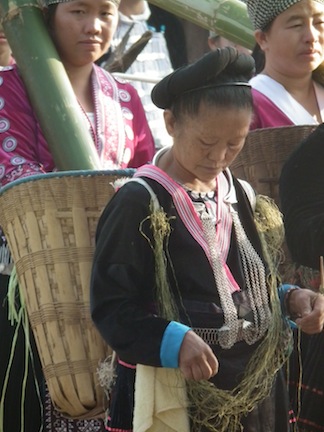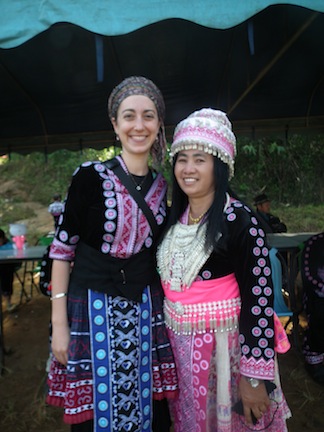The Hmong New Year: What the Jews Can Learn from the Hmong People
Last week, we went to a village near Chiang Mai in Thailand to join in the celebration of the Hmong (Mong) New Year. The Hmong people are an ethnic minority, originally from Southern China, but beginning in the 18th century, they started moving south due to political unrest.

A Hmong woman doing traditional string weaving while carrying a basket on her back. She is dressed in traditional Hmong clothing.
One thing really impressed me about the Hmong people when Rabbi Ben and I were at the Hmong New Year celebration last week. That was how the vast majority of the Hmong still clung so steadfastly to their traditional ways. Most of the Hmong were dressed in very traditional costumes, which they still make themselves, to this very day. Most of the activities and competitions were traditional ones that would have been exactly the same hundreds (if not thousands) of years ago. And most of the dances, songs, and performances were completely traditional. Even the food was still cooked on the fire like it has been since time immemorial.
The Ba’al Shem Tov says that everything we see has a purpose and that Hashem shows us each and every detail because we must learn a lesson from it. So, what lesson can we learn from the Hmong people?
The Hmong hill tribes of Thailand are not assimilating. They do incorporate certain useful tools from the modern world, such as trucks, phones, and microphones/speakers. They even use washing machines! Yet, they do not change their fundamental culture. They still keep to their traditions. They dress differently from the rest of the people living in Thailand. They still sew their own clothes; even though it would be simple just to mass-produce and sell them, their clothing is a way they demonstrate their skills and also their unique identities. They still have their own language, spoken at home and in the village.

Rebbetzin Rachel dressed in traditional Hmong clothing, standing with a young Hmong villager. She is dressed in traditional Hmong clothing. All the Hmong women, young and old, still sew their own ceremonial outfits, holding onto their tradition.
We Jews also have our own culture and heritage. Yes, we can take certain advantages from the modern world; there is nothing wrong with that. Yet, we must cling to the vital parts of our traditions. Unlike the Hmong people, we no longer need to sew our clothes; however, we must still make sure we are holding to our beliefs and dressing modestly, even if it makes us different. We have certain foods that we must and must not eat; we should not assimilate with the world around us that eats anything and everything with no limits. We have our own community… let’s not lose it. Like the Hmong people, let’s stick together!
So that is what I learned from the Hmong people when I attended their New Year’s celebration. It was a beautiful experience and I am really glad I went. I learned so much, both about them and about myself.
Happy Hmong New Year!





